Ditapis dengan

Protections Against Neutron Radiation, and so on
This book consist: Introduction; Elements of neutron protection; Radiation protection in installation and operation of neutron sources; Rules for protection against neutron radiation, and so on. (Jml)
- Edisi
- -
- ISBN/ISSN
- -
- Deskripsi Fisik
- - p. : illus. ; 23 cm
- Judul Seri
- NCRP Report No. 38, 39, 40, 41
- No. Panggil
- 359.725 NCR p
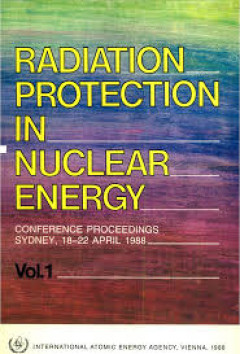
Radiation Protection in Nuclear Energy, Vol. 2, Conference Proceedings Sidney…
Proceedings of a conference, Sydney, Australia, 18–22 April 1988. The purpose of the conference was to exchange views on the principles of radiation protection, to highlight issues of current importance, to examine the problems encountered in applying the principles of radiation protection and, where possible, to identify generic solutions. The important topics covered were the interface betw…
- Edisi
- -
- ISBN/ISSN
- 9200204880 / 00741884
- Deskripsi Fisik
- 522 p. : Illus. ; 24 cm
- Judul Seri
- -
- No. Panggil
- 363.1799 IAE r

Diagnosis and Treatment of Radiations Injuries
The main purpose of this report is to assist physicians involved in the early medical handling of radiation victims to apply prompt diagnostic measures and emergency treatment. Special emphasis is given to localized radiation injuries, which are the most frequently occurring direct health effects observed from ionizing radiation. The lessons learned from the accidents at Chernobyl (Ukraine, 198…
- Edisi
- -
- ISBN/ISSN
- 9201004982 / 10206450
- Deskripsi Fisik
- 49 p. : illus. ; 24 cm
- Judul Seri
- Safety Reports Series No. 2
- No. Panggil
- 616.28 IAE d
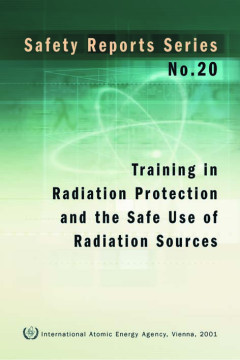
Training in Radiation Protection and the Safe Use of Radiation Sources
This report provides assistance in how to organize adequate and appropriate training for personnel working with ionizing radiation. It is primarily intended to be used by trainers and training providers, and covers among other topics the various methods of training provision and gives advice on the development and organizational aspects associated with the management of training activities. It …
- Edisi
- -
- ISBN/ISSN
- 9201006012/10206450
- Deskripsi Fisik
- 69 p. : Illus. ; 24 cm
- Judul Seri
- Safety Reports Series No. 20
- No. Panggil
- -
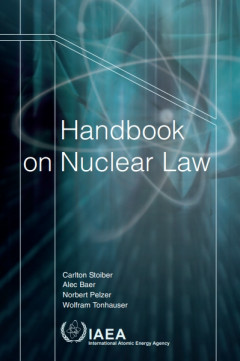
Handbook of Nuclear Law
Membahas tentang Nuclear energy-law and legislation-Handbooks, manual, etc. 2. Radiation-safety measures-Handbooks, manual, etc. 3. Nuclear reactors-safety measures-Handbooks, manuals, etc. 4. Liability for nuclear damages-Handbooks, manual, etc. 5. Nuclear nonproliferation-Handbooks, manuals, etc. (Jml)
- Edisi
- -
- ISBN/ISSN
- 9201057032
- Deskripsi Fisik
- xviii, 168 p. : illus. ; 24 cm
- Judul Seri
- -
- No. Panggil
- 621.4803 SHO h

Organization and Implementation of a National Regulatory Infrastructure Gover…
This book consist : Introduction; Legal framework for a radiation protection and safety infrastructure; Basic elements of a regulatory programme; Role of the regulatory authority in emergency; Role of the regulatory authority in relation to intervention in chronic exposure situations; and Assessment of the effectiveness of the regulatory programme. (Jml)
- Edisi
- -
- ISBN/ISSN
- 10114289
- Deskripsi Fisik
- 150 p. : Illus. ; 29 cm
- Judul Seri
- IAEA-TECDOC-1067
- No. Panggil
- 539.722 IAE o

The Safe Management of Sources of Radiation: Principles and Strategies
This INSAG report deals with the general principles governing the safety of all sources of radiation and with the application of these principles. It seeks to demonstrate that, at the conceptual level, the distinction traditionally made between nuclear safety and radiation protection is not justified. This report is primarily intended for the non-specialist who needs to take decisions about the…
- Edisi
- -
- ISBN/ISSN
- 9201021992 / 10252169
- Deskripsi Fisik
- 27 p. : Illus. 24 cm
- Judul Seri
- INSAG-11
- No. Panggil
- 539.2 IAE s

Radiation, People and the Environmental
Radiation is a fact of life. We live in a world in which radiation is naturally present everywhere. Light and heat from nuclear reactions in the Sun are essential to our existence. Radioactive materials occur naturally throughout the environment, and our bodies contain radioactive materials such as carbon-14, potassium-40 and polonium-210 quite naturally. All life on Earth has evolved in the pr…
- Edisi
- -
- ISBN/ISSN
- -
- Deskripsi Fisik
- -
- Judul Seri
- -
- No. Panggil
- -
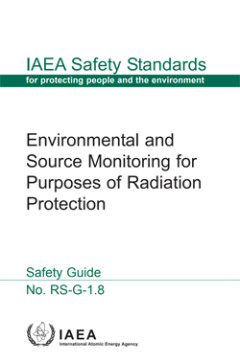
Environmental and Source Monitoring for Purposes of Radiation Protection, Saf…
The purpose of this Safety Guide is to provide international guidance, coherent with contemporary radiation protection principles and IAEA safety requirements, on the strategy of monitoring in relation to: (a) control of radionuclide discharges under practice conditions, and (b) intervention, such as in cases of nuclear or radiological emergencies or past contamination of areas with long lived …
- Edisi
- -
- ISBN/ISSN
- 9201134045 / 1020525X
- Deskripsi Fisik
- 119 p. : Illus. ; 24 cm
- Judul Seri
- Safety Standards No. RS-G-1.8
- No. Panggil
- -
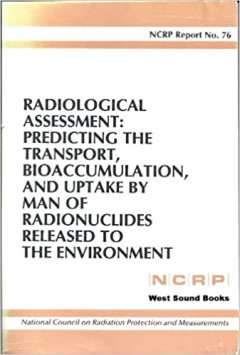
Radiological Assessment: Predicting the Transport, Bioaccumulation, and Uptak…
The purpose of this Report is to review the current status of the application of radionuclide transport models from the point of discharge to the environment to the point of intake by man. This process, called radiological assessment, begins by defining the quantity of radionuclides that are released and enter the environment. Uncertainties in the measurements or estimates of the source term ar…
- Edisi
- -
- ISBN/ISSN
- 0913392669
- Deskripsi Fisik
- 300 p. : Illus. ; 23 cm
- Judul Seri
- NCRP Report No. 76
- No. Panggil
- 628.5 NCR r
 Karya Umum
Karya Umum  Filsafat
Filsafat  Agama
Agama  Ilmu-ilmu Sosial
Ilmu-ilmu Sosial  Bahasa
Bahasa  Ilmu-ilmu Murni
Ilmu-ilmu Murni  Ilmu-ilmu Terapan
Ilmu-ilmu Terapan  Kesenian, Hiburan, dan Olahraga
Kesenian, Hiburan, dan Olahraga  Kesusastraan
Kesusastraan  Geografi dan Sejarah
Geografi dan Sejarah